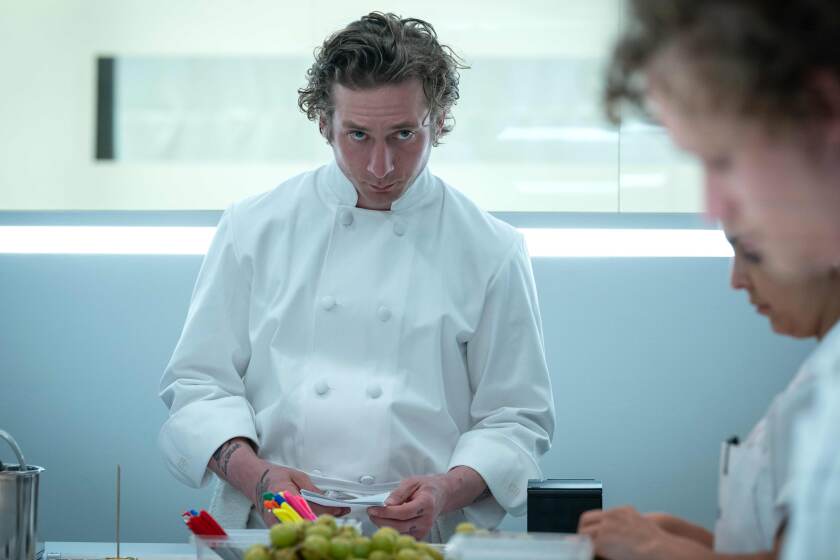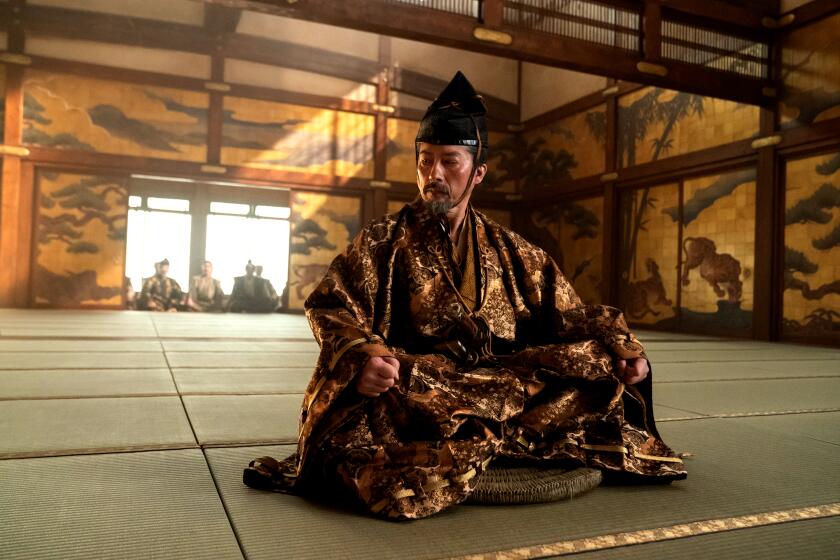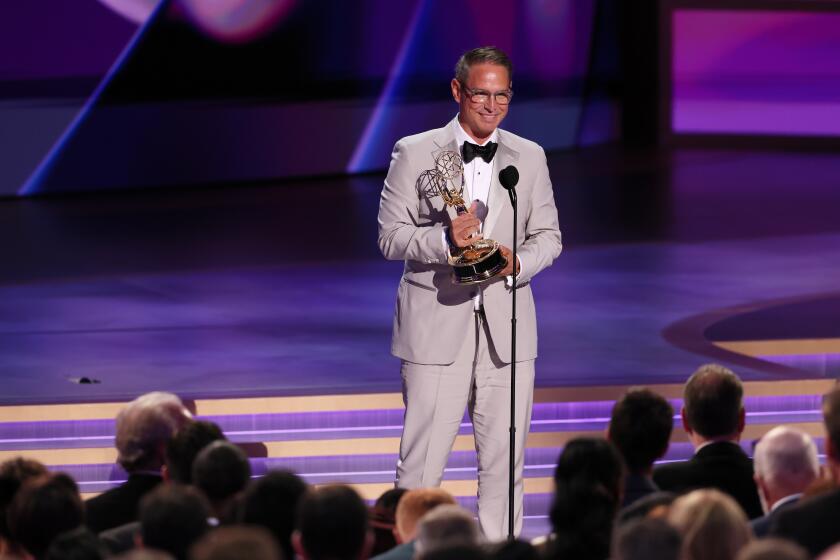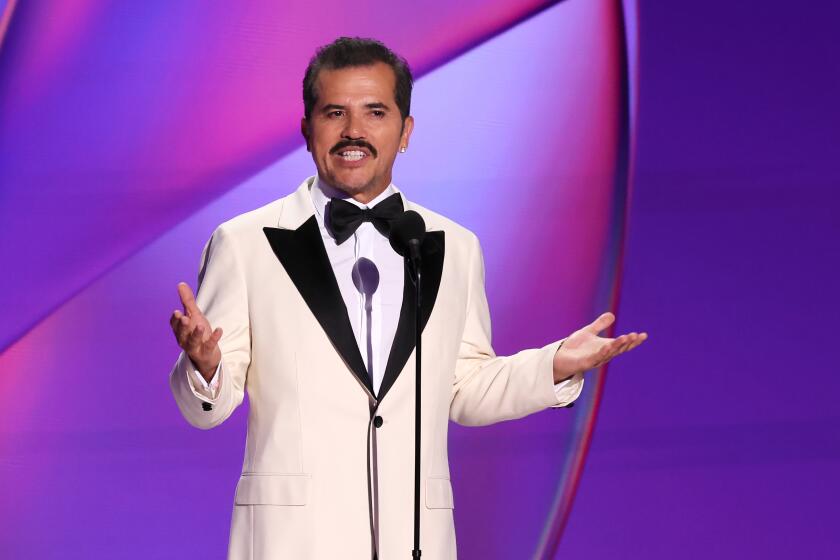‘Shōgun’ co-creators Justin Marks and Rachel Kondo on their 25 Emmy nominations: ‘It’s surreal’
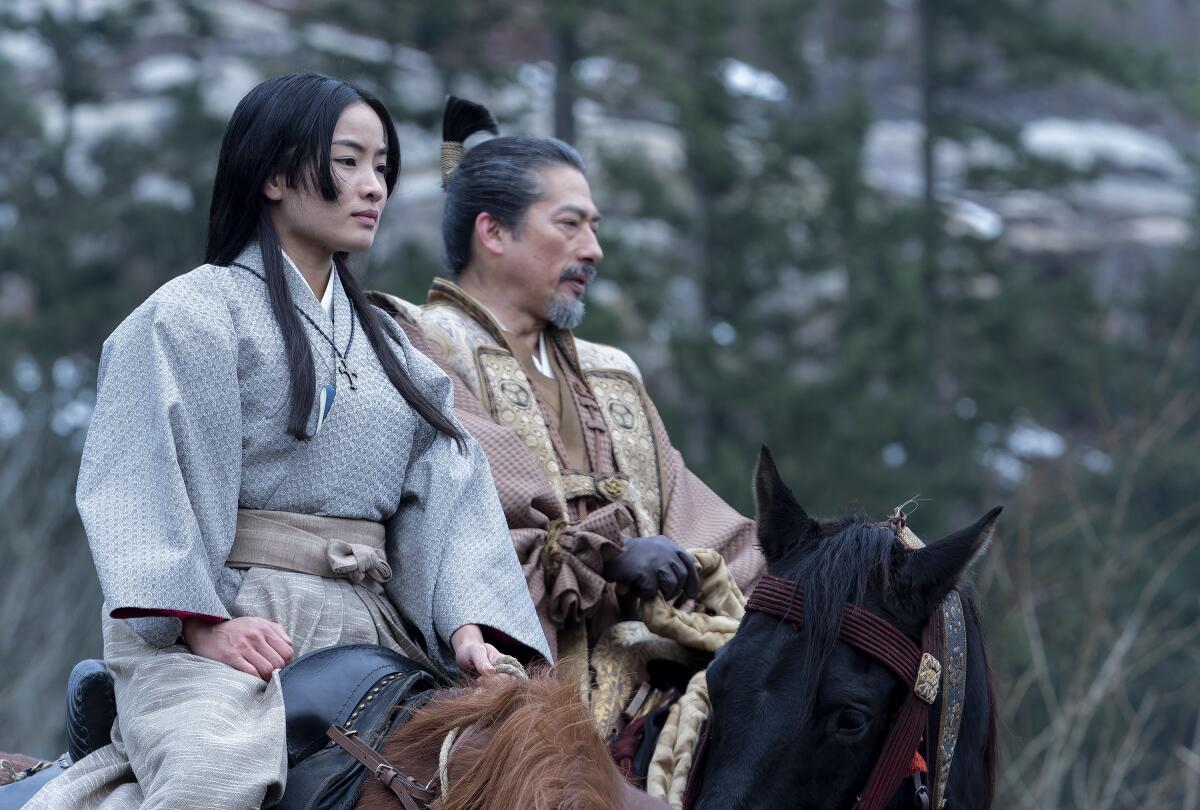
- Share via
For “Shōgun” creators Rachel Kondo and Justin Marks, Emmy nominations morning started quite early.
“We were listening to the roosters crowing at 5 in the morning here,” said Marks during a video call from Hawaii on Wednesday after the 76th Emmy Award nominations were announced. “It’s just so damn early.”
FX’s Japanese historical drama was the top nominee, earning 25 nominations including series, acting nods for leads Hiroyuki Sanada and Anna Sawai, and supporting nods for Tadanobu Asano and Takehiro Hira. “Shōgun’s” nominations helped push its network’s total nomination haul to an impressive 93.
While Kondo and Marks’ morning has included “a lot of tears and FaceTimes and texts and calling” with its global cast and crew, in many ways, it was just another Wednesday.
FX’s “The Bear” and “Shogun” were among the top nominees for the 76th Emmy Awards announced on Wednesday.
“Our girls woke up and wanted breakfast,” said Marks.
“The cats wanted to be fed,” Kondo added. “The dogs wanted to be fed. Everybody just wants food right now.”
For the record:
3:59 p.m. July 22, 2024An earlier version of this article misstated novelist James Clavell’s first name as John.
Set in feudal Japan, “Shōgun” follows the story of Lord Ishii Toranaga (Sanada), his marooned English prisoner John Blackthorne (Cosmo Jarvis) and vassal Toda Mariko (Sawaii). Based on the 1975 novel by James Clavell, the series was renewed for additional seasons in May.
Kondo and Marks discussed “Shōgun’s” nominations, their work on Season 2 and more in this conversation edited for length and clarity.
Congratulations. 25 nominations is massive. How are you feeling?
Justin Marks: A lot of tears were had out here at 5-something in the morning, Hawaii time. It’s been a long road to this day, and the road still continues stretched out in front of us, because we got to get into the writers room in a matter of minutes. We’re just so proud of this cast and this crew that made this show and made the show what it is. None of this was obvious. It was like, how would this make any sense as a big-budget show? Subtitled, period, no dragons.
Rachel Kondo: Unfamiliar faces.
Marks: And the only reason it works is because of everyone who’s now been recognized. So that is really satisfying to just remember, the sea of faces in Vancouver in the rain and the snow and the mud every night. All of them are being recognized now for their hard work and for making the show what it is.
Kondo: That’s what’s gratifying about the volume of nominations. The 25 nominations to me [and] I hope to everybody suggests how many people work on the show. This cannot be a reflection of just an individual. That’s why it feels funny for only us to be here, I want us to all collectively be in a room together, but that is not to be. I just think it is a testament to collective effort and how when everybody is aiming for excellence, it can result in something truly special and unprecedented so it feels very — Justin just told me the word I was looking for is “heartening.”
Marks: It’s also great because I know there are some among the group who are veterans who have been nominated many times across their careers, but for the most part you’d be hard sought to find in these 25 nominees people who have been recognized before. This is really the first time.
Kondo: For a lot of us this is our first job in the business. It’s so wild.
Marks: I say this as someone whose first credit was a martial arts video game adaptation, I never thought I’d be in a place like this today. It’s surreal.
Netflix led the Emmy nominations with 107 overall, but it was FX that received the most in the marquee categories, including a record tally for ‘The Bear.’
You touched on this, but “Shōgun” isn’t an easy show. It obviously wasn’t easy to make, but also for viewers. The subtitles. The themes. A culture and history that’s likely unfamiliar. What has it been like for you to see the audience’s response to the show?
Kondo: We asked a lot from viewers. We asked them to bring their whole selves to the viewing experience and the fact that they did it means that I feel like we’re celebrating something that transcends viewership. It transcends any one individual. Basically we’re celebrating what we can all do together when you do set yourself aside and you participate in something bigger.
Marks: It’s also just a testament to James Clavell and the book he wrote. At the end of the day, we just want a good story. When you find a good story [and] we can connect with it, it doesn’t matter who the faces are or what the language is. So to see so many people who speak different languages being recognized now in the American awards conversation is just heartening.
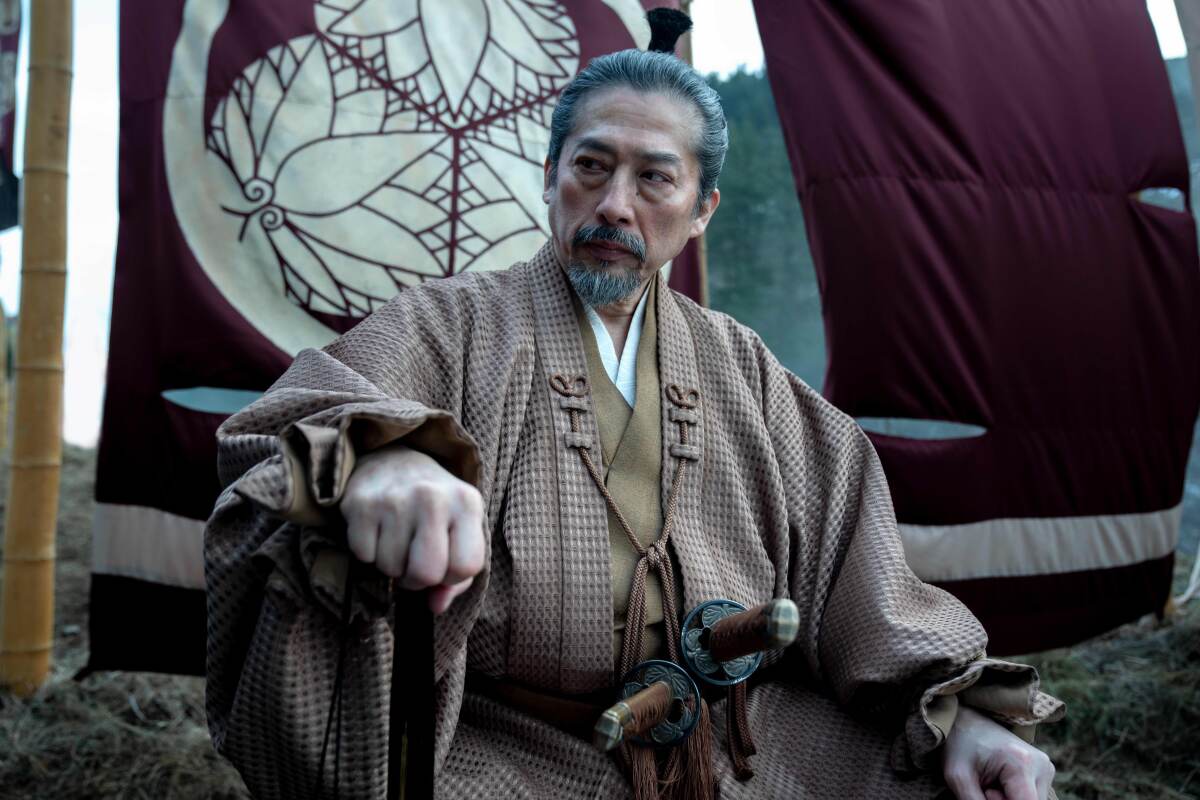
The show was a group endeavor, but you both also got individual writing nominations. “Anjin” and “Crimson Sky” were the episodes nominated for writing and the latter in particular really blew me away.
Marks: Caillin [Puente] and Rachel sharing credit on that episode and [“Crimson Sky”] being theirs, that was where the tears really started this morning for me. Because Caillin, years ago, was my assistant and seeing my former assistant and my wife getting recognized together for all the work that they did. Caillin is one of [the people] who really bled for this show for years and years and years to see it made. For her to get this is really just a moving thing.
Kondo: We were holding our mouths. We FaceTimed each other and we’re just holding our mouth for two minutes because we didn’t know what to say. We didn’t even have words.
Marks: It’s great that we’re back in the second-season writers room right now with all the same writers who made Season 1 what it is and whose work is recognized in that series nomination. I look forward to a lot of celebration today. But mostly, I look forward to everyone getting back to work. We got a lot of note cards on the wall.
Kondo: I look forward to possibly a mimosa. Just one.
Marks: But there are lots of unresolved questions [from] yesterday’s story session that we need answer pitches on today. So let’s not get distracted and do the work because more than anything, this writers room was so close in the first season five years ago and we’re all getting to come back together again. With the weight of this show and the praise and success of this show, I think too often it gets forgotten [that] it has to stand on the shoulders of the writers. I think all the writers should just share together in the writing awards because everyone puts this show together in a group. That’s the best part about writing. I consider all these awards their awards. I’m excited to see faces so that we can all celebrate it.
I know we’re celebrating Season 1, but since you bring up Season 2, what was it about the show that made you want to continue beyond the story of the novel? At what point did you know there was more for you to dig into?
Kondo: We always circled around the stuff that we weren’t able to include in Season 1. We still think about it and we still are excited by it. So it’s fun to see if there’s a way to keep going with it.
Marks: We’ve done a lot of pondering. The show, it’s not necessarily a reflection of the world as it is today, right? It’s 1600 and in a different culture than at least American culture. But in a lot of ways, when it comes to characters like Mariko and Toranaga, it’s a reflection of maybe the way we wish people could be in the world. And why wouldn’t we want to keep telling those stories when the world is what it is? It’s nice sometimes to go to a world like this where people have principle and they really stand for it and, in some cases, yes, die for it. But they really believe in what they believe.
Kondo: Belief is the key word for me. You want to spend time with people who believe in something desperately and passionately and I think you can’t get any more profound believers than these characters.
Lady Mariko and Ochiba are among “Shōgun’s” women who navigated their social constraints in feudal Japan to live on their own terms.
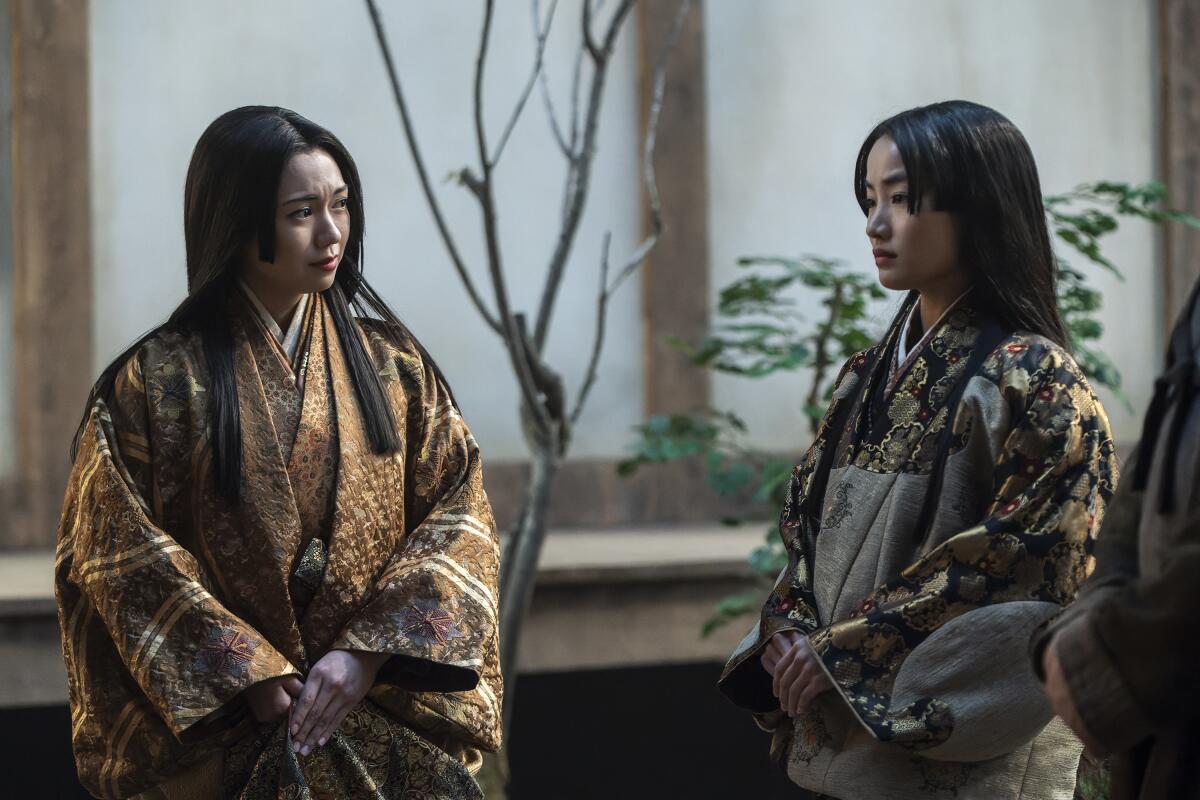
That brings me back to “Crimson Sky” because that was the episode where it becomes clear that the show is called “Shōgun,” but it’s Mariko’s story. What’s the next chapter if her story is done?
Marks: I think the ripple effect of the decision she made and the message that her life is, [are things] that have a long tail. And that echo is what is reverberating through the story that we’re continuing to find. I think the audiences will be very surprised and hopefully pleased by some of the ideas that have long been in our heads that are now finally showing up on the wall. This is why I go back to crediting the writers for the success of the show because so much of what this show is, is what they brought to the show and their curation and interpretation and their fresh ideas to bring the work into the modern age. And it’s the same people doing it again and people should have great confidence in that.
Any additional thoughts?
Marks: Hiro and Anna being recognized in lead categories is really just so exciting. Not just because [they’re] fresh faces in the awards conversation but because for Hiro Sanada, this is decades of work since he was 7 years old as a child actor coming to a day like this. I’m so proud to have gotten to be part of something that is finally recognizing him and his extraordinary career.
Kondo: As someone who grew up never seeing someone like me onscreen. I never did. The fact that Anna is being recognized is something that I’ll be processing for a long time because I just didn’t know certain things were possible. Because you’re given what you’re given at the time you grow up and this exceeds anything I could have even imagined. I’m so proud of her. And it’s important, I have daughters now and maybe they get to see someone like her and what she’s done and think that they can do things too. So it means so much for her to be recognized in this way.
More to Read
The complete guide to home viewing
Get Screen Gab for everything about the TV shows and streaming movies everyone’s talking about.
You may occasionally receive promotional content from the Los Angeles Times.
